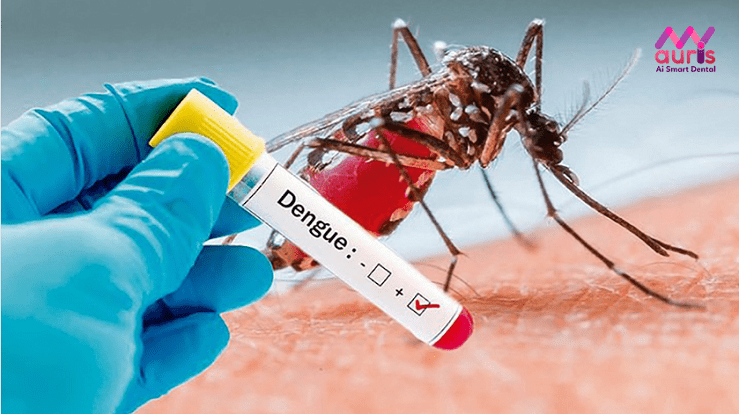How mild are the symptoms of dengue fever? During the rainy season, when the air humidity increases, dengue fever outbreaks occur. Furthermore, anyone can get this disease. Therefore, if you are unlucky enough to have dengue fever, it is very important to be equipped with knowledge about the symptoms and how to handle the infection. Let’s join My Auris to find out the detailed information below!
Causes of dengue fever in humans
The cause of dengue fever is caused by the Dengue virus because the vector that transmits the disease is the mosquito with the scientific name Aedes aegypti, which injects the disease-causing virus into the patient’s bloodstream by biting.
Dengue virus has 4 different serotypes: DEN 1, DEN 2, DEN 3, DEN 4. Patients infected with a virus strain that can create immunity to that virus strain.

What is the most common way that dengue fever is transmitted variable?
With many incorrect views about dengue fever, including many issues of disease transmission as well as can contact with people with dengue fever transmit the disease? Dengue fever is not transmitted through contact with sick people, but is commonly transmitted through the following routes:
Directly transmitted by the bite of Aedes aegypti mosquitoes
This is a common route of infection from one person to another. The Aedes aegypti mosquito is the vector that transmits dengue fever. After sucking the blood of a person with dengue fever to a healthy person, then biting a healthy person will introduce the virus into the body and cause disease.
Indirect transmission through blood or sharing needles
The route of transmission is more common than transmission by mosquito bites. On the contrary, people who do not have the disease will have a higher risk of getting the disease if they take blood from a carrier and pass it on to a healthy person or when a healthy person shares a needle.
Other routes of transmission are less common.
- Hospital transmission: Dengue virus can be transmitted through blood products or exposure to needlestick injuries or mucosal injuries.
- Vertical transmission: Pregnant women about 10 days before giving birth, if carrying the virusDengue virus in the blood can transmit the virus to the baby after birth. Furthermore, dengue fever can manifest in newborns at 4 – 11 days old.

Such mild symptoms of dengue fever
In our country, dengue fever outbreaks usually break out around July – October, which is also the rainy season, causing air humidity to increase, and many stagnant ponds help mosquitoes reproduce.
Dengue fever symptoms usually appear after about 3-5 days of incubation from virus infection. Depending on the stage and severity of the disease, patients have different symptoms. Some typical symptoms of specific dengue fever include:
High fever
High fever is the earliest symptom of dengue fever, patients usually have a fever of about 39 – 40 degrees Celsius or higher. If the high fever persists, it will be dangerous, so it is necessary to quickly reduce the fever.
Severe headache
Similar to many other viral diseases, dengue hemorrhagic fever caused by the Dengue virus causes symptoms of body aches, joint and muscle pain. Furthermore, the patient will feel more intense pain in the forehead and eyeballs.
Nausea feeling
Digestive disorders are also common symptoms in dengue fever patients. The most common symptoms are severe abdominal pain, vomiting, loss of appetite, etc.
Hemorrhage
Dengue can cause bleeding in many locations and organs in the body, signs of recognition: red spots on the skin, bleeding gums, nosebleeds, vomiting blood, black stools, etc.
Other symptoms
When the patient enters the severe stage, the patient will have many dangerous signs such as: body fatigue, lethargy, loss of consciousness, cold limbs, abnormal heart rate, frequent vomiting, etc. Severe bleeding such as low blood pressure, damage Damage to internal organs causes the patient’s body to die if not treated promptly.

How to treat dengue fever?
Currently, the disease There is no specific treatment for dengue fever, most patients will recover within 2 weeks. At this time, doctors will treat the symptoms to limit the possible progression of the disease. Mild cases can recover on their own after a week. On the contrary, severe cases need to be treated and control the risk of severe disease progression by reducing fever, giving fluids, and actively treating shock.
According to Dr. Truong Huu Khanh, Dr. Truong Huu Khanh recommends: “Do not arbitrarily take fever-reducing drugs or antibiotics because this is a quite common mistake when treating dengue fever at home. The cause of dengue fever is caused by the Dengue virus, not bacteria. Therefore, antibiotics are not effective in treating this disease.
However, patients need to have a healthy diet, providing fiber and vitamin C, and drink plenty of water. Furthermore, spend a lot of time resting and avoid eating a lot of fat and indigestion. In particular, maintain and monitor for about 12 days, at which point the patient needs to return to the medical facility for re-examination and if no unusual complications occur, it means you have recovered.

Prevention of dengue fever How?
Vaccination
In June 2016, the world’s first dengue fever vaccine Dengvaxia was licensed for circulation. Furthermore, many countries have put this vaccine into use, including three Southeast Asian countries (ASEAN): Thailand, Singapore, and the Philippines. However, currently Vietnam has not used this type of vaccine, because the immunity against dengue fever is not high. Therefore, there are still concerns about the effectiveness and safety when implementing it for people.
Preventing mosquito bites
Currently there is no vaccine for dengue fever andspecific medication. Aedes mosquitoes are the intermediate source of disease transmission and the best way to prevent dengue fever with the slogan: “No larvae/larvae, no dengue fever”. To significantly reduce the risk of an outbreak.
Dengue fever is a condition that requires immediate medical attention or hospitalization for monitoring. However, there is no specific way for dengue fever in general and dengue fever signs in particular. Furthermore, monitoring the period of dengue shock from 24 to 48 hours is very important, as it can be life-threatening or even fatal. Therefore, don’t be subjective about your health!
Kim Dung





